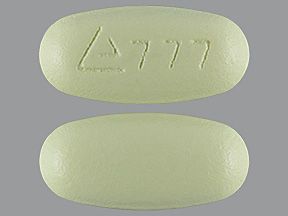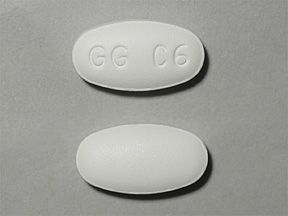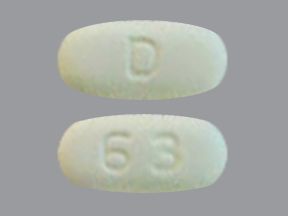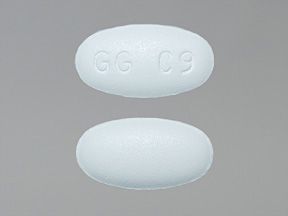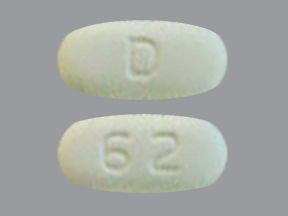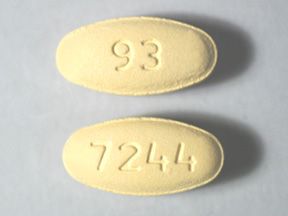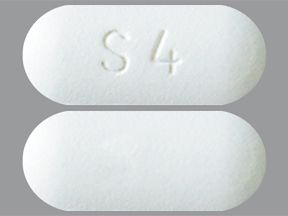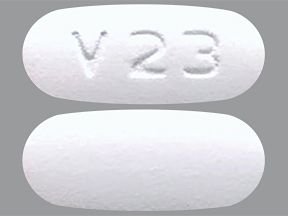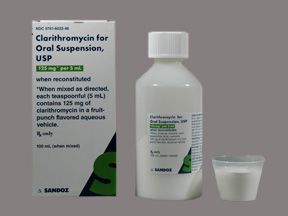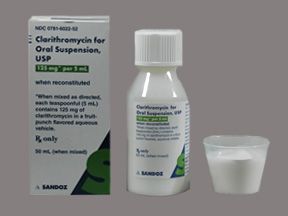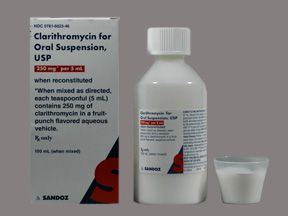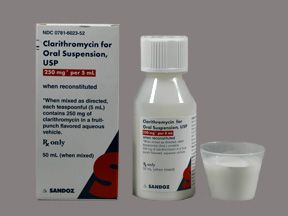Clarithromycin is a generic prescription drug that’s used to treat or prevent certain types of bacterial infections. It comes in various forms, including an immediate-release oral tablet.
- Clarithromycin oral tablet is only available as a generic drug. It doesn’t have a brand-name version.
- Clarithromycin oral tablet comes in an immediate-release form and an extended-release form. Clarithromycin also comes as an oral suspension. Note that this article focuses on the oral tablet forms.
- This drug is used to prevent and treat certain infections caused by bacteria.
Clarithromycin can cause mild or serious side effects. The following list contains some of the key side effects that may occur while taking clarithromycin. This list does not include all possible side effects.
For more information on the possible side effects of clarithromycin, or tips on how to deal with a troublesome side effect, talk with your doctor or pharmacist.
More common side effects
The more common side effects of clarithromycin oral tablet include:
- abdominal pain
- diarrhea
- nausea
- vomiting
- changes in how things taste
If these effects are mild, they may go away within a few days or a couple of weeks. If they’re more severe or don’t go away, talk with your doctor or pharmacist.
Serious side effects
Call your doctor right away if you have serious side effects. Call 911 if your symptoms feel life threatening or if you think you’re having a medical emergency. Serious side effects and their symptoms can include the following:
- Liver problems. Symptoms can include:
- itchy skin
- loss of appetite
- upper abdominal pain
- dark-colored urine
- yellowing of your skin or the whites of your eyes
- Heart rate problems. Symptoms can include:
- fast or chaotic heartbeats
- Allergic or hypersensitivity reactions. Symptoms can include:
- skin reactions such as painful rash or blisters, with red or purple spots on light skin or purple, gray, or white spots on dark skin
- difficulty breathing
- swelling of your face, lips, tongue, or throat
- Liver problems warning: This drug may cause liver problems. Tell your doctor if you have symptoms of liver problems. These include dark-colored urine, itchiness, upper abdominal pain, loss of appetite, or yellowing of your skin or the whites of your eyes. Also let your doctor know if you already have liver problems before starting clarithromycin, as this drug may worsen your condition.
- QT prolongation warning: Clarithromycin may cause a heart rhythm problem called QT prolongation, or long QT syndrome. This condition may cause fast, chaotic heartbeats and can be fatal. Already having QT prolongation or an abnormal heart rhythm can increase your risk of this side effect. Certain medications and certain lab abnormalities can also indicate an increased risk of long QT syndrome. If any of these factors apply to you, tell your doctor. They may suggest a treatment other than clarithromycin for your infection.
- Diarrhea warning: Almost all antibiotics, including clarithromycin, can cause Clostridioides difficile-associated diarrhea. This condition may result in mild diarrhea. But it can also cause severe inflammation of your colon, which can be fatal. Call your doctor if you have diarrhea during or after treatment with this drug.
- Long-term mortality warning: For 1 to 10 years after taking this drug, people with coronary artery disease may be at increased risk of death for any reason. The benefits of this drug should be weighed against this risk.
Clarithromycin oral tablet is a prescription drug that’s only available as a generic drug. Generic drugs usually cost less.
Clarithromycin oral tablet comes in an immediate-release form and an extended-release form. “Immediate release” means the drug is released into your body right away. “Extended release” means the drug is slowly released into your body over a long period of time.
Clarithromycin also comes as an oral liquid suspension (a type of liquid mixture). Note that this article only covers clarithromycin oral tablet.
Why it’s used
Clarithromycin is used to prevent and treat certain infections caused by bacteria.
The Food and Drug Administration (FDA) has approved clarithromycin immediate-release oral tablet to treat the following in adults:
- sinusitis (sinus infection)
- acute exacerbation (sudden worsening) of chronic (long-term) bronchitis
- community-acquired pneumonia (pneumonia contracted in the community as opposed to in a hospital setting)
- uncomplicated (simple) infections of the skin and skin structure (soft tissue), which may involve wounds, abscesses, ulcers, or burns
- infections caused by mycobacteria
- acute otitis media, a type of ear infection
- Helicobacter pylori (H. pylori) infection and duodenal ulcer disease
- pharyngitis or tonsillitis, which are infections of the mouth
Clarithromycin is also used for prevention of mycobacterial infections. In addition, the drug may be used in certain children to treat some of these bacterial infections.
Note that clarithromycin extended-release oral tablet is only approved to treat acute sinusitis, acute exacerbation of chronic bronchitis, and community-acquired pneumonia in adults.
Clarithromycin may be used with other drugs to treat H. pylori infections. These drugs include:
- amoxicillin
- lansoprazole (Prevacid)
- omeprazole (Prilosec)
- esomeprazole (Nexium)
- rabeprazole (Aciphex)
- bismuth subsalicylate (Pepto-Bismol)
- metronidazole (Flagyl)
Clarithromycin may also be prescribed with other drugs to treat certain mycobacterial infections. Examples include:
- ethambutol (Myambutol)
- rifampin (Rifadin)
- moxifloxacin (Avelox)
How it works
Clarithromycin belongs to a class of drugs called antibiotics. Specifically, clarithromycin is a type of antibiotic called a macrolide. A class of drugs is a group of medications that work in a similar way. These drugs are often used to treat similar conditions.
Clarithromycin works by stopping the bacteria that are causing an infection from multiplying.
This drug should only be used to treat or prevent bacterial infections. It shouldn’t be used to treat viral infections such as the common cold.
Clarithromycin can interact with several other medications. Different interactions can cause different effects. For instance, some can interfere with how well a drug works, while others can cause increased side effects.
Below is a list of medications that can interact with clarithromycin. This list does not contain all drugs that may interact with clarithromycin.
Before taking clarithromycin, be sure to tell your doctor and pharmacist about all prescription, over-the-counter, and other drugs you take. Also tell them about any vitamins, herbs, and supplements you use. Sharing this information can help you avoid potential interactions.
If you have questions about drug interactions that may affect you, ask your doctor or pharmacist.
Drugs you should not use with clarithromycin
Taking certain drugs with clarithromycin can cause dangerous effects in your body. Examples of drugs you shouldn’t take with clarithromycin include:
- Colchicine: If you have kidney or liver problems, you shouldn’t take colchicine (Colcrys) and clarithromycin together. People with kidney or liver problems might have higher levels of colchicine in their body. Taking these drugs together can increase your risk of side effects of colchicine.
- Certain statins (drugs used to treat cholesterol): Certain statins, including simvastatin (Zocor) and lovastatin (Altoprev), may cause severe muscle problems when taken with clarithromycin.
- Sildenafil, tadalafil, and vardenafil: If taken with clarithromycin, levels of sildenafil (Viagra), tadalafil (Cialis), or vardenafil may build up in your body and cause more side effects.
- Ergotamine and dihydroergotamine: Taking ergotamine (Ergomar) or dihydroergotamine (Migranal) with clarithromycin may cause sudden narrowing of your blood vessels. It may also cause reduced blood flow to your arms and legs.
- Pimozide: Taking this drug with clarithromycin may result in serious, abnormal heart rhythms.
- Certain HIV drugs: If taken with clarithromycin, medications for HIV can build up in your body or cause clarithromycin to build up in your body. This may cause more side effects or cause either drug to not be as effective. Examples of such drugs include atazanavir (Reyataz), lopinavir, nelfinavir (Viracept), and ritonavir (Norvir).
- Antifungal drugs: Drugs for treating fungal infections, when used with clarithromycin, can build up in your body or cause clarithromycin to build up in your body. This may cause more side effects or cause either drug to not be as effective. Examples of antifungals include itraconazole (Sporanox), ketoconazole, and voriconazole (Vfend).
- Lurasidone: Taking lurasidone (Latuda) with clarithromycin can cause lurasidone to build up in your body and lead to serious side effects.
Interactions that increase your risk of side effects
Taking clarithromycin with certain medications may cause more side effects. Examples of these drugs include:
- Benzodiazepines: If you take benzodiazepines such as such as triazolam (Halcion) and midazolam with clarithromycin, you may feel more sedated and drowsy.
- Insulin and certain oral diabetes drugs: You may have a significant decrease in your blood sugar levels if you take insulin or certain oral diabetes drugs with clarithromycin. Examples of oral diabetes drugs that could interact with clarithromycin include nateglinide, pioglitazone (Actos), and repaglinide. You may need to monitor your blood sugar levels closely while taking these drugs together.
- Warfarin: You may have more bleeding if you take warfarin (Jantoven) with clarithromycin. Your doctor will monitor you closely if you take these drugs together.
- Certain statins (drugs used to treat cholesterol): Taking clarithromycin with certain statins, such as atorvastatin (Lipitor) and pravastatin, may cause muscle problems. Your doctor may change the dose of your statin if you need to take these drugs together.
- Quinidine and disopyramide: Taking either quinidine or disopyramide (Norpace) with clarithromycin may cause serious abnormal heart rhythms. Your doctor may monitor your heart rhythm and the levels of quinidine or disopyramide in your body.
- Calcium channel blockers: Taking calcium channel blockers together with clarithromycin may cause a drop in blood pressure and kidney problems. Examples of calcium channel blockers, which are used to treat high blood pressure, include verapamil (Verelan), amlodipine (Norvasc), diltiazem (Cardizem), and nifedipine (Procardia XL).
- Theophylline: Your doctor may monitor your theophylline blood levels if you take this drug with clarithromycin.
- Carbamazepine: Your doctor may monitor your carbamazepine (Equetro) blood levels during clarithromycin treatment.
- Digoxin: If you take digoxin (Lanoxin) with clarithromycin, your doctor may monitor your digoxin blood levels.
- Quetiapine: Taking quetiapine (Seroquel) with clarithromycin may cause sleepiness, low blood pressure upon standing, confusion, and heart rhythm problems. Your doctor should monitor you closely with this combination.
Interactions that can make your drugs less effective
When certain drugs are used with clarithromycin, they may not work as well. This is because the amount of these drugs in your body may be decreased. An example of these drugs is zidovudine (Retrovir). You should take clarithromycin and zidovudine at least 2 hours apart.
This drug comes with several warnings.
Allergy warning
Clarithromycin can cause a severe allergic reaction. Symptoms can include:
- hives
- difficulty breathing
- swelling of your face, lips, tongue, or throat
Call 911 or go to the nearest emergency room if you develop these symptoms. Do not take this drug again if you’ve ever had an allergic reaction to it. Taking it again could be fatal.
Warnings for people with certain health conditions
For people with coronary artery disease: For 1 to 10 years after taking this drug, you may be at increased risk of death for any reason. Researchers have not yet determined the cause of this risk. Before taking this drug, talk with your doctor about the benefits of this drug versus this risk.
For people with kidney problems: This drug is removed from your body by your kidneys. If you have problems with kidney function, this drug may build up in your body. This can cause more side effects. If you have severe kidney problems, you may need a lower dose, or you may need a different dosing schedule.
For people with myasthenia gravis: If you have myasthenia gravis (a condition that causes muscle weakness), this drug may make your symptoms worse.
For people with a history of abnormal heart rhythms: Talk with your doctor about whether this drug is safe for you. This drug may increase your risk of heart-related death.
Warnings for other groups
For pregnant females: Clarithromycin should only be used during pregnancy when there are no safer alternatives. This is because of two things:
- Research in animals has shown adverse effects to the fetus when a pregnant animal is given the drug.
- There haven’t been enough studies done in humans to be certain how the drug might affect a human fetus.
Tell your doctor if you’re pregnant or planning to become pregnant. Clarithromycin should be used during pregnancy only if the potential benefit justifies the risk.
For females who are breastfeeding: Clarithromycin passes into breast milk and may cause side effects in a child who is breastfed. Talk with your doctor if you breastfeed or are planning to do so. You may need to decide whether to stop breastfeeding or stop taking this medication.
For children: This drug hasn’t been shown to be safe and effective for children younger than 20 months with mycobacterium avian complex (based on the use of clarithromycin suspension). This drug hasn’t been studied in children younger than 6 months for other infections. It should not be used in children younger than 6 months.
Note: In this article, we use the term “female” to refer to someone’s sex assigned at birth. For information about the difference between sex and gender, see this article.
The clarithromycin dosage your doctor prescribes will depend on several factors. These include:
- the type and severity of the condition you’re taking clarithromycin to treat
- your age
- the form of clarithromycin you take
- other medical conditions you may have
- other medications you may take
The following information describes dosages that are commonly used or recommended. However, be sure to take the dosage your doctor prescribes for you. Your doctor will determine the best dosage to suit your needs.
Note: Dosages for children are based on their body weight in kilograms (kg), with 1 kg equal to about 2.2 pounds (lb). Your child’s doctor will calculate this dosage.
Forms and strengths
Generic: clarithromycin
- Form: immediate-release oral tablet
- Strengths: 250 milligrams (mg), 500 mg
- Form: extended-release oral tablet
- Strengths: 500 mg
“Immediate release” means the drug is released into your body right away. “Extended release” means the drug is slowly released into your body over a long period of time. Note that the extended-release oral tablet is for use in adults only.
Dosage for acute sinusitis
Adult dosage (ages 18 years and older)
- Oral tablet: 500 mg taken every 12 hours for 14 days
- Extended-release oral tablet: 1,000 mg taken every 24 hours for 14 days
Child dosage (ages 6 months to 17 years)
The recommended dosage of the oral tablet is 15 mg per kg of body weight per day (mg/kg/day). It should be divided into two daily doses, with a dose given once every 12 hours, for 10 days. The maximum dose for children is the same as the adult dose.
Child dosage (ages 0 to 5 months)
It hasn’t been confirmed that this drug is safe and effective for use in children younger than 6 months.
Special considerations
People with kidney problems: If your creatinine clearance (a marker of kidney function) is less than 30 milliliters per minute (mL/min), your doctor will give you half the standard dose.
Dosage for acute exacerbation of chronic bronchitis
Adult dosage (ages 18 years and older)
- Oral tablet: 250 or 500 mg taken every 12 hours for 7 to 14 days depending on the type of bacteria causing the infection
- Extended-release oral tablet: 1,000 mg taken every 24 hours for 7 days
Child dosage (ages 0 to 17 years)
This drug hasn’t been shown to be safe and effective for children ages 17 years and younger for this condition.
Special considerations
People with kidney problems: If your creatinine clearance is less than 30 mL/min, your doctor will give you half the standard dose.
Dosage for community-acquired pneumonia
Adult dosage (ages 18 years and older)
- Oral tablet: 250 mg taken every 12 hours for 7 to 14 days depending on the type of bacteria causing the infection
- Extended-release oral tablet: 1,000 mg taken every 24 hours for 7 days
Child dosage (ages 6 months to 17 years)
The recommended dosage of the oral tablet is 15 mg/kg/day. It should be divided into two daily doses, with a dose given once every 12 hours, for 10 days. The maximum dose for children is the same as the adult dose.
Child dosage (ages 0 to 5 months)
It hasn’t been confirmed that this drug is safe and effective for use in children younger than 6 months.
Special considerations
People with kidney problems: If your creatinine clearance (a marker of kidney function) is less than 30 mL/min, your doctor will give you half the standard dose.
Dosage for uncomplicated skin and skin structure infections
Adult dosage (ages 18 years and older)
Oral tablet: 250 mg taken every 12 hours for 7 to 14 days
Child dosage (ages 6 months to 17 years)
The recommended dosage of the oral tablet is 15 mg/kg/day. It should be divided into two daily doses, with a dose given once every 12 hours, for 10 days. The maximum dose for children is the same as the adult dose.
Child dosage (ages 0 to 5 months)
It hasn’t been confirmed that this drug is safe and effective for use in children younger than 6 months.
Special considerations
People with kidney problems: If your creatinine clearance (a marker of kidney function) is less than 30 mL/min, your doctor will give you half the standard dose.
Dosage for the treatment and prevention of mycobacterial infections
Adult dosage (ages 18 years and older)
Oral tablet: 500 mg taken twice per day
Child dosage (ages 6 months to 17 years)
The recommended dosage is 7.5 mg/kg every 12 hours, up to 500 mg every 12 hours.
Child dosage (ages 0 to 5 months)
It hasn’t been confirmed that this drug is safe and effective for use in children younger than 6 months.
Special considerations
People with kidney problems: If your creatinine clearance (a marker of kidney function) is less than 30 mL/min, your doctor will give you half the standard dose.
Dosage for acute otitis media
Adult dosage (ages 18 years and older)
This drug isn’t used in this age group for this condition.
Child dosage (ages 6 months to 17 years)
The recommended dosage of the oral tablet is 15 mg/kg/day. It should be divided into two daily doses, with a dose given once every 12 hours, for 10 days. The maximum dose for children is 500 mg.
Child dosage (ages 0 to 5 months)
It hasn’t been confirmed that this drug is safe and effective for use in children younger than 6 months.
Special considerations
People with kidney problems: If your creatinine clearance (a marker of kidney function) is less than 30 mL/min, your doctor will give you half the standard dose.
Dosage for helicobacter pylori infection and duodenal ulcer disease
Adult dosage (ages 18 years and older)
- Oral tablet: Your dosage depends on what drugs you’re taking clarithromycin with.
- With amoxicillin and omeprazole or lansoprazole: 500 mg taken every 12 hours for 10 to 14 days
- With omeprazole: 500 mg taken every 8 hours for 14 days
Child dosage (ages 0 to 17 years)
This drug hasn’t been shown to be safe and effective for children ages 17 years and younger for this condition.
Special considerations
People with kidney problems: If your creatinine clearance (a marker of kidney function) is less than 30 mL/min, your doctor will give you half the standard dose.
Dosage for pharyngitis or tonsillitis
Adult dosage (ages 18 years and older)
Oral tablet: 250 mg taken every 12 hours for 10 days
Child dosage (ages 6 months to 17 years)
The recommended dosage of the oral tablet is 15 mg/kg/day. It should be divided into two daily doses, with a dose given once every 12 hours, for 10 days. The maximum dose for children is 500 mg.
Child dosage (ages 0 to 5 months)
It hasn’t been confirmed that this drug is safe and effective for use in children younger than 6 months.
Special considerations
People with kidney problems: If your creatinine clearance (a marker of kidney function) is less than 30 mL/min, your doctor will give you half the standard dose.
Clarithromycin oral tablet is usually prescribed for short-term treatment. It comes with risks if you don’t take it as prescribed.
If you stop taking the drug or don’t take it at all: If you don’t take this drug, your infection may not improve or it may get worse.
If you miss doses or don’t take the drug on schedule: Your medication may not work as well or may stop working completely. For this drug to work well, a certain amount needs to be in your body at all times.
If you take too much: You could have dangerous levels of the drug in your body. Symptoms can include:
- abdominal pain
- diarrhea
- nausea
- vomiting
If you think you’ve taken too much of this drug, call your doctor. You can also call 800-222-1222 to reach America’s Poison Centers or use its online resource. If your symptoms are severe, call 911 or go to the nearest emergency room right away.
What to do if you miss a dose: Take your dose as soon as you remember. But if you remember just a few hours before your next scheduled dose, take only one dose. Never try to catch up by taking two doses at once. This could result in dangerous side effects.
How to tell if the drug is working: The symptoms of your infection and the infection itself should go away if this drug is working.
Whether you have health insurance or not, cost may be a factor when you’re considering clarithromycin. What you’ll pay for clarithromycin may depend on several things, such as your treatment plan and the pharmacy you use.
Here are a few things to consider regarding cost:
- Cost information and savings coupons: You can visit Optum Perks to get price estimates of what you’d pay for clarithromycin when using coupons from the site. See the coupon options below. (Note: Optum Perks coupons cannot be used with insurance copays or benefits.)
- Savings programs and other assistance: If you have questions about how to pay for your prescription, talk with your doctor or pharmacist. If you need financial support to pay for clarithromycin or help to understand your insurance coverage, try one of these sites:
You can also check out this article to learn more about saving money on prescriptions.
Save on your clarithromycin prescription
Save on clarithromycin without insurance.
Enter your information:
Location
47201
Dosage
500mg clarithromycin (28 Tablets)
Save money without using insurance
Simply show the Optum Perks coupon at your preferred pharmacy or order online and instantly save up to 80% without using insurance. The coupon doesn’t expire, so be sure to save it for refills.
Retail price refers to the manufacturer’s published list price and is up to date as of 3/2023. Retail and discounted prices are U.S.-only and can vary based on region and pharmacy. We cannot guarantee that the discounted price listed here will exactly match the price at your pharmacy. Please contact your pharmacy for the exact price.
Optum Perks and Healthline are subsidiaries of RVO Health.
Pricing source:Perks.optum.com

Keep these considerations in mind if your doctor prescribes clarithromycin oral tablet for you.
General
- You can take the immediate-release tablets with or without food. You should take the extended-release tablets with food.
- You can crush the immediate-release oral tablets. You should not cut or crush the extended-release oral tablets. Swallow them whole.
Storage
- Store clarithromycin between 68°F and 77°F (20°C and 25°C).
- Don’t store this medication in moist or damp areas, such as bathrooms.
Refills
A prescription for this medication is refillable. You should not need a new prescription for this medication to be refilled. Your doctor will write the number of refills authorized on your prescription.
Travel
When traveling with your medication:
- Always carry your medication with you. When flying, never put it into a checked bag. Keep it in your carry-on bag.
- Don’t worry about airport X-ray machines. They can’t damage your medication.
- You may need to show airport staff the pharmacy label for your medication. Always carry the original prescription-labeled box with you.
- Don’t put this medication in your car’s glove compartment or leave it in the car. Be sure to avoid doing this when the weather is very hot or very cold.
Clinical monitoring
You and your doctor should monitor certain health issues. This can help make sure you stay safe while you take this drug. This monitoring may be done using:
- Liver function tests: Your doctor may do blood tests to check how well your liver is working. If your liver isn’t working well, your doctor may have you stop taking this drug.
- Kidney function tests: Your doctor may do blood tests to check how well your kidneys are working. If your kidneys aren’t working well, your doctor may give you a lower dose of the drug.
- White blood cell count: Your doctor may do blood tests to check how well your body and medication are fighting the infection. If your levels are not improving, your doctor may have you stop taking this drug and recommend another.
There are other drugs available to treat your condition. Some may be better suited for you than others. Talk with your doctor about other drug options that may work for you.
Disclaimer: Healthline has made every effort to make certain that all information is factually correct, comprehensive, and up to date. However, this article should not be used as a substitute for the knowledge and expertise of a licensed healthcare professional. You should always consult your doctor or another healthcare professional before taking any medication. The drug information contained herein is subject to change and is not intended to cover all possible uses, directions, precautions, warnings, drug interactions, allergic reactions, or adverse effects. The absence of warnings or other information for a given drug does not indicate that the drug or drug combination is safe, effective, or appropriate for all patients or all specific uses.

